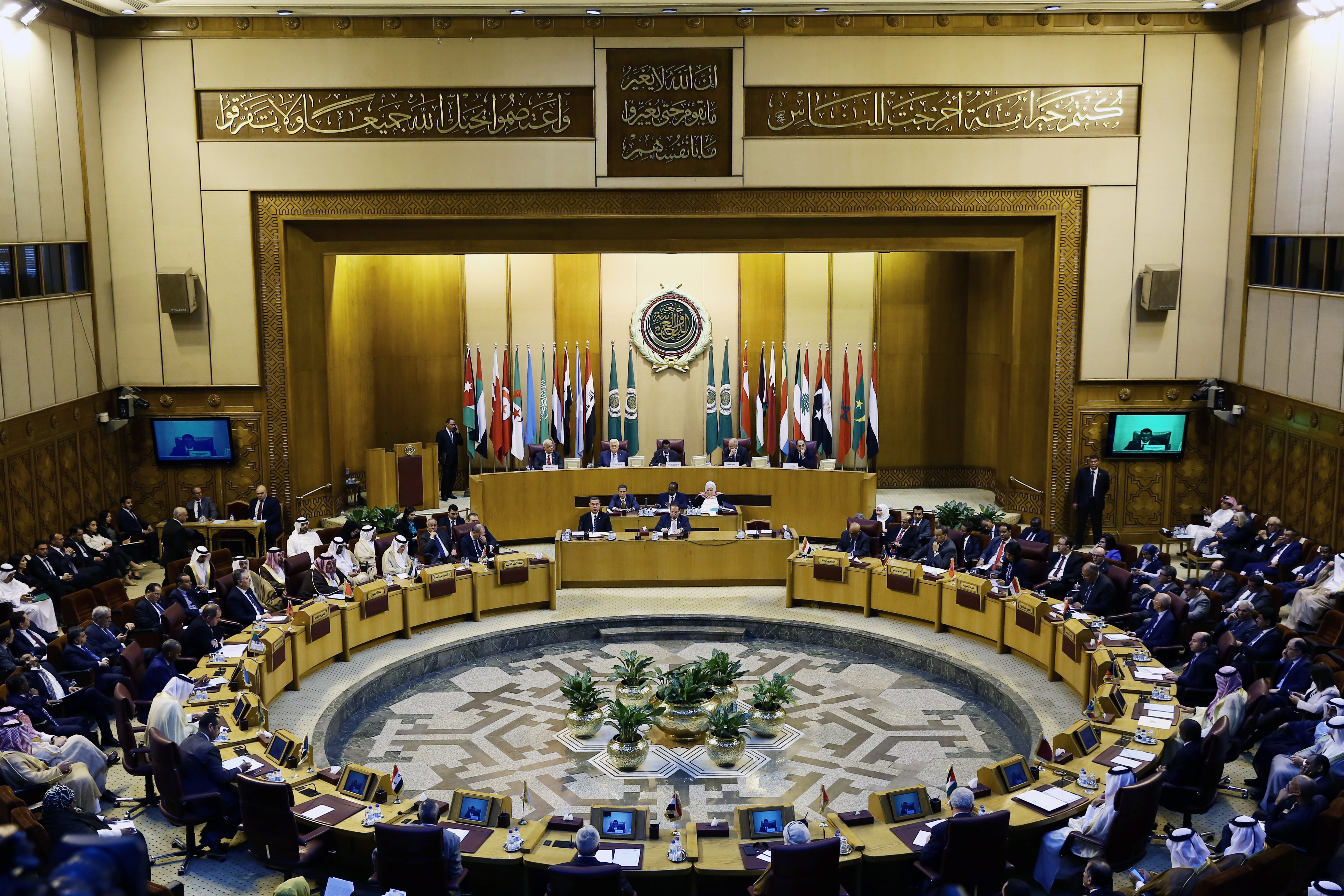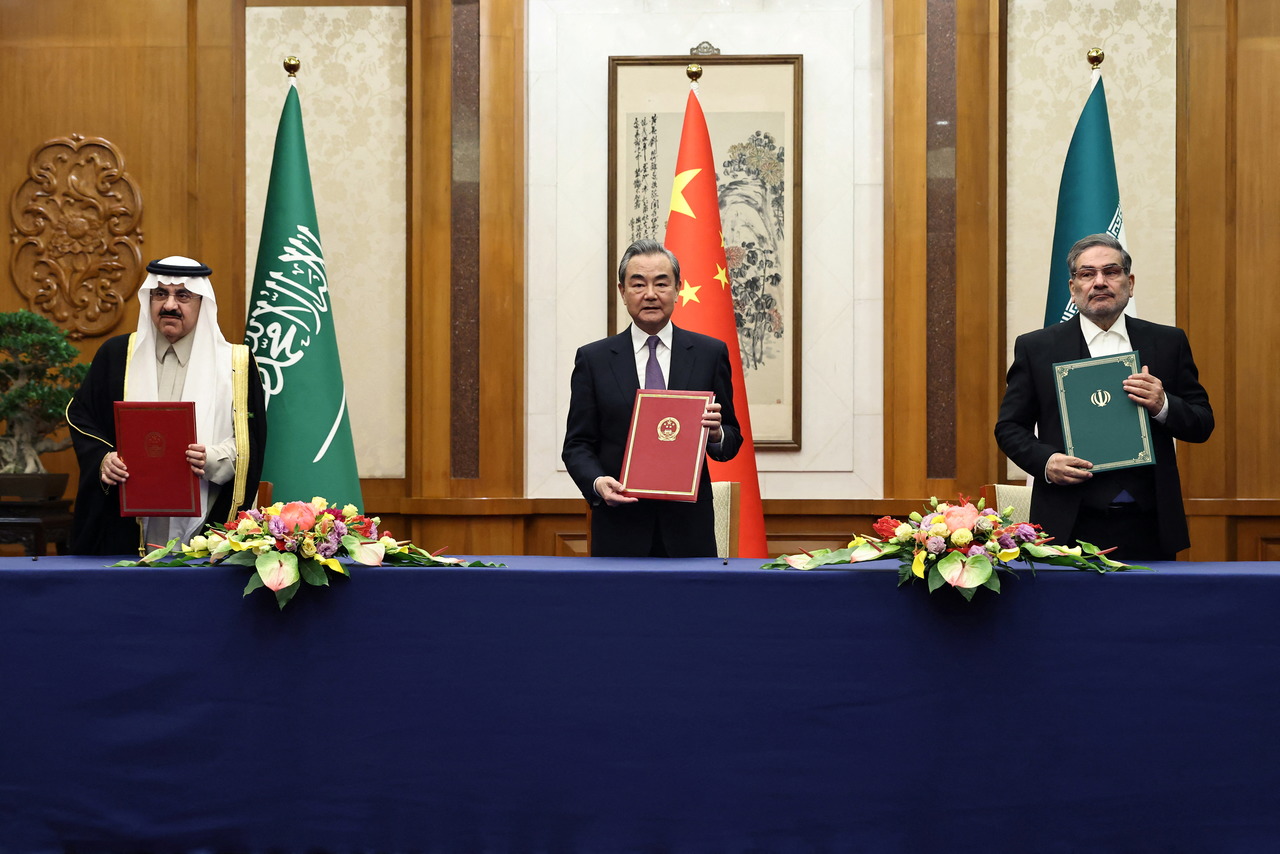Syria returns to the Arab League
The decision to restore Syria’s membership in the Arab League (AL) is aimed at Arab states gaining greater control over the situation in the region and reducing external influence, including that of the West. Although the AL imposed a number of obligations on Syrian leader Bashar al-Assad, such as holding elections, it is doubtful whether the League can enforce them. The organisation’s decision to normalise relations with Syria will be used to undermine the effectiveness of the sanctions in counteracting violations of international law, also in the context of the Russian aggression against Ukraine.
.jpg) ABDULLA AL NEYADI/UAE PRESIDENTI / Reuters / Forum
ABDULLA AL NEYADI/UAE PRESIDENTI / Reuters / Forum
Why did the Arab League make this decision?
On 7 May, Arab foreign ministers restored Syria’s membership in the League after 12 years of suspension following Assad’s brutal repression of Syrian protesters. In 2011, Saudi Arabia, Qatar, and the United Arab Emirates (UAE) supported the Syrian opposition and sought to isolate the Assad regime, motivated by, among other things, the Syrian government’s close relations with Iran. Most Arab states then withdrew their diplomats from Syria. In recent years, however, the leaders of the UAE and Bahrain normalised relations with the Assad regime. At the same time, they declared that further isolation and the sanctions against it after it regained control over most of Syria territory prevented the country’s reconstruction and aggravated the situation of Syrians. Qatar, whose representatives did not attend the summit on 7 May, remains opposed to a return to normal relations with Assad. The principality’s leaders announced instead that they support the creation of a joint Arab initiative to resolve the conflict in Syria.
What are the conditions for Syria’s return to the AL?
The basis for restoring Syria’s membership was the arrangements made at the meeting of the foreign ministers of Syria, Iraq, Jordan, Saudi Arabia, and Egypt on 1 May in Amman, which included a commitment by the Assad regime to combat drug trafficking. The leaders also announced they will work to restore Syrian control over the country’s entire territory and end the presence of paramilitary and terrorist groups in Syria, although limiting the activity of Iranian-linked militias and those involved in drug trafficking remains the priority. The AL decision also included the Syrian regime’s commitment to ensuring the safe return of refugees and launching a political process that will culminate in free elections. In turn, the Arab governments obliged themselves to trying to achieve a political solution to the conflict in accordance with UN Security Council Resolution 2254, aiming at a political transformation in accordance with the will of the people of Syria. At the same time, the AL allowed Syria to immediately return to the organisation, which allows it to participate in the League’s summit planned for 19 May in Riyadh. This indicates that normalisation with Syria is more important than the conditions imposed on Assad.
What changed the attitude of key Arab leaders?
The road to the AL’s decision was paved by the intensification of diplomatic contacts between Syria and other Arab states after the earthquake in February this year. At that time, Saudi Foreign Minister Prince Faisal bin Farhan declared that a belief among most Arab states of the need to negotiate with Assad as the most effective way to counter the growing humanitarian crisis. In turn, the signing of the Saudi-Iranian normalisation agreement convinced the Saudis of the benefits of adopting a similar line towards Syria and unlocked the possibility of the latter’s return to the AL. The leaders of many Arab states, especially those of Saudi Arabia and the UAE, are also convinced that the normalisation of relations with Syria will allow them to gain greater control over the situation in the region. In their opinion, 12 years of Assad’s isolation have strengthened Iran’s influence in the Middle East, which is unfavourable for the Arab world.
The return of Syria to the AL also fits in with the narrative, spread especially by the monarchs in the Persian Gulf, about the need to build an Arab community based on the authoritarian nature of the regimes, capable of engaging in mutual relations with as little involvement of external actors as possible, such as the U.S., Turkey, or Iran. At the same time, the economic cooperation agreements with Iran signed just before the League summit indicate that Assad will want to maintain Iran’s influence in Syria.
How will Syria’s return to the AL affect the lives of Syrian residents and refugees?
Restoring Syria’s membership will involve increased humanitarian and development aid from Arab states but it will not significantly improve the living conditions of Syrians. The main obstacle in this respect will be Assad’s staying in power and his reluctance towards a political process leading to the lifting of international sanctions and, consequently, foreign investment. In light of the growing social pressure to limit the presence of Syrian refugees in neighbouring countries, normalisation may give Turkey and Jordan in particular an excuse to deport them, putting them at risk. Already, reports of forced returns of Syrian refugees are coming from Lebanon. Human rights organisations point out that refugees who took part in anti-government protests or were associated with Syrian activists and who were transported by the Lebanese services to Syria, disappeared after reaching the country.
In the longer term, the AL’s decision may be related to attempts by the Arab states to work out an agreement between Turkey and Assad regarding the Syrian territories controlled by Turkey, as well as attempts to de-legitimise U.S. support for the Syrian Democratic Forces that control the north-eastern part of the country. If these actions are successful, it would mean further waves of repression against the inhabitants of these areas.
How will the AL decision affect Western policy towards Syria and authoritarian regimes?
The AL’s decision reinforces the belief in authoritarian states that the most severe force can be used to maintain power and regain international recognition. It will also strengthen the narrative of Arab leaders regarding Western sanctions as the main obstacle in efforts to resolve the conflict in Syria. Arab unity on Syria will be used to pressure the U.S. and EU countries to lift some of the sanctions and normalise relations with Assad. Taking into account the previous interest in cooperation with Assad in countries like Hungary and Italy, this may weaken the coherence of EU policy towards Syria. The EU’s stance is particularly important because a possible withdrawal from sanctions against the regime of a war criminal would undermine the credibility of the actions of Western states in Ukraine as aimed at defending the international order based on the rule of law. In turn, in the debate on Russian aggression against Ukraine in Arab states, the AL decision can be used as “evidence” of the harm of the sanctions imposed on Russia and increase resistance to supporting the West’s attitude towards the Russian aggression.





